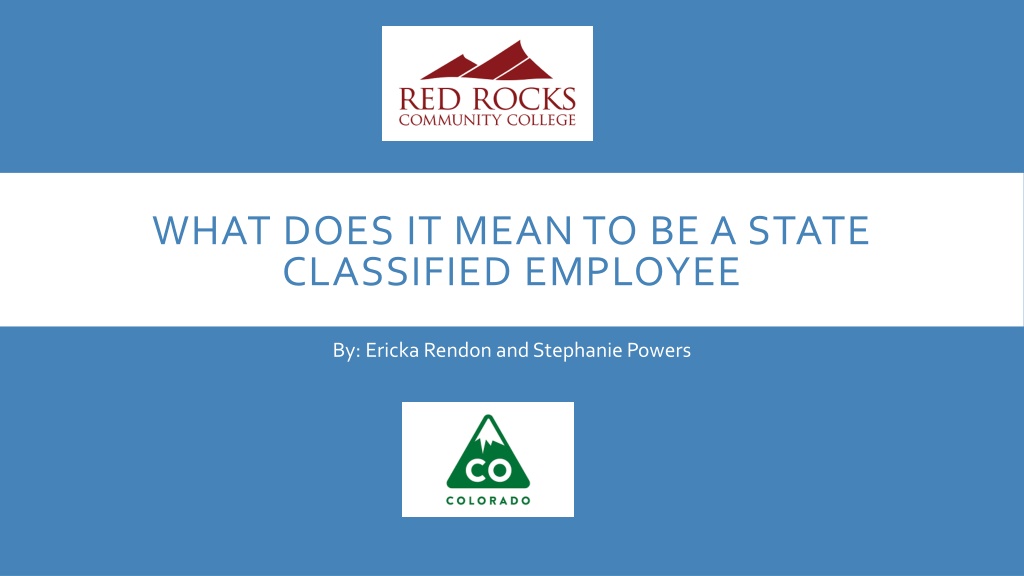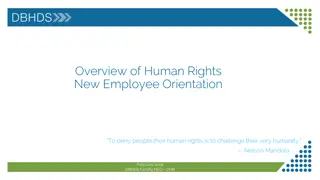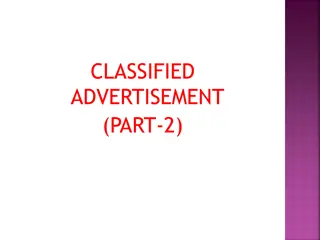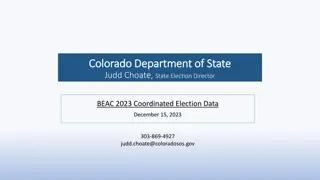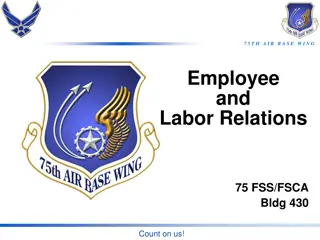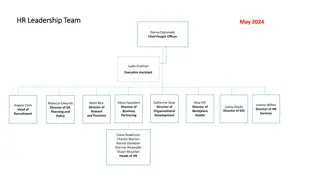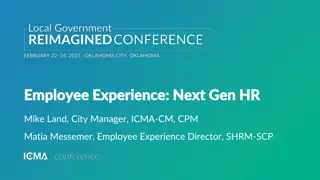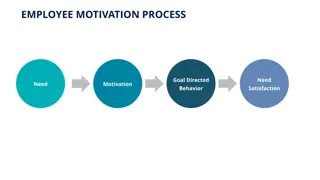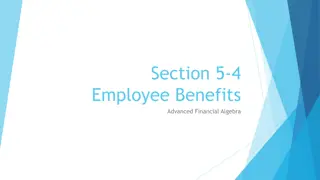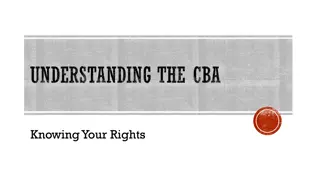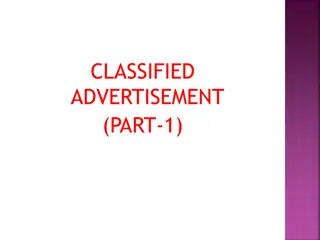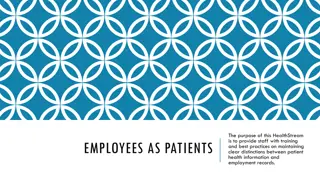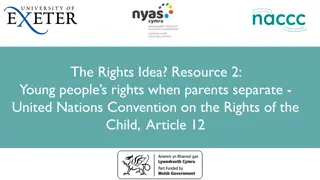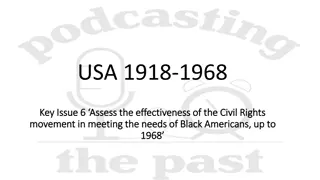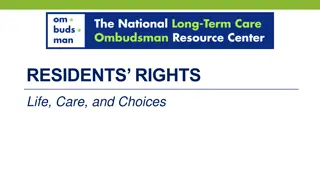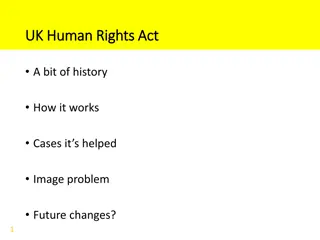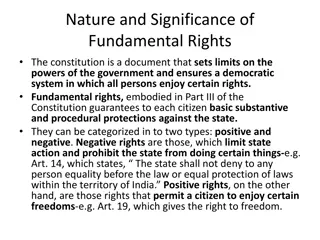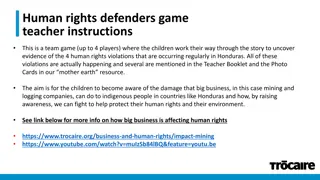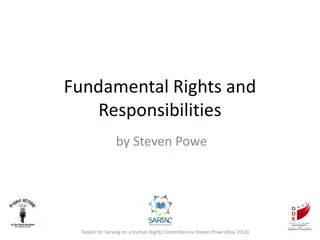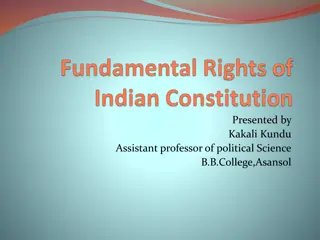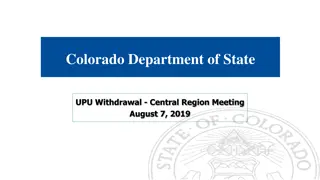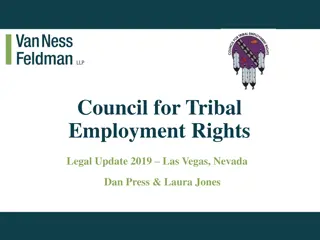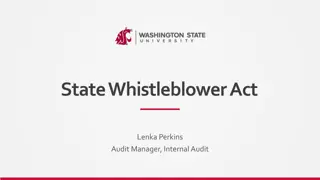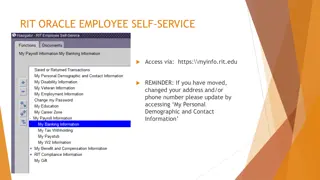Employee Rights in Colorado State Classified System
The State Personnel System in Colorado provides certain rights and protections for employees in state classified positions, including appeal and grievance rights. Classified employees must adhere to employment laws and are safeguarded against discrimination, retaliation, and harassment. Various federal and state laws ensure a fair work environment for all state employees.
Download Presentation

Please find below an Image/Link to download the presentation.
The content on the website is provided AS IS for your information and personal use only. It may not be sold, licensed, or shared on other websites without obtaining consent from the author. Download presentation by click this link. If you encounter any issues during the download, it is possible that the publisher has removed the file from their server.
E N D
Presentation Transcript
WHAT DOES IT MEAN TO BE A STATE CLASSIFIED EMPLOYEE By: Ericka Rendon and Stephanie Powers
EMPLOYEE RIGHTS IN THE STATE CLASSIFIED SYSTEM The State Personnel System is established by the Colorado Constitution (CO Const. art. XII, 13) as the civil service system for employees in a State classified position. All appointive public officers and employees of the State are considered part of the classified system, except for those positions excluded by CO Const. art XII, 13(2). Classified employees have certain appeal and grievance rights established specifically for the State Personnel System in the State s constitution, statutes, Personnel Board Rules and Personnel Director s Administrative Procedures, and the policies at respective State departments, agencies, and institutions of higher education. Classified employees are required to follow all laws governing their employment, including applicable provisions of the State s constitution, statutes, Personnel Board Rules and Personnel Director s Administrative Procedures and policies at respective State departments, agencies and institutions of higher education. Information from the Classified Employee Handbook
APPOINTMENT Depending on the type of appointment, employees are placed in one of the following employment statuses. Employment status determines the rights of an employee in the State Personnel System. Probationary Certified Trail service Conditional Provisionary Temporary If you have questions about any of these appointments please refer to page 7 in the Classified Employee handbook. Information from the Classified Employee Handbook
EMPLOYMENT LAWS Anti-Discrimination, Retaliation & Workplace Harassment The State of Colorado values and respects all employees. The State is committed to maintaining a work environment free from any form of employee harassment, retaliation, or discrimination, and compliance with federal and state laws prohibit this type of behavior. State employees are protected from workplace discrimination, retaliation, and harassment under various federal and state laws, including but not limited to: The Colorado Anti-Discrimination Act (C.R.S. 24-34-401, et seq.), which prohibits employment discrimination, retaliation, and harassment based on disability, race, creed, color, sex, sexual orientation, religion, age, national origin, or ancestry. The State Employee Protection (Whistleblower) Act (C.R.S. 24-50.5-101, et seq.), which prohibits retaliation for disclosure of information in certain circumstances. Title VII of the Civil Rights Act of 1964 (42 U.S.C. 2000 (e), et seq.), which prohibits discrimination based on race, sex, color, religion, and national origin. The Pregnancy Discrimination Act of 1978, an amendment to Title VII, which prohibits discrimination based on pregnancy, childbirth, or other related medical conditions. The Family and Medical Leave Act (FMLA) (29 U.S.C. 2601, et seq.), which entitles eligible employees to take unpaid, job- protected leave for specified family and medical reasons. The Americans with Disabilities Act as Amended (ADAAA) of 2008, which prohibits discrimination against qualified persons with a disability. The Fair Labor Standards Act (FLSA) (29 U.S.C. 201), which establishes compensation requirements. Information from the Classified Employee Handbook
UNIVERSAL POLICIES Universal Policies are to be applied uniformly across all State departments, agencies and institutions of higher education and represent the consensus of executive directors to apply the rules governing these situations in the same way Information from the Classified Employee Handbook
THE STATE OF COLORADO UNIVERSAL POLICIES Affirmative Action Program Americans with Disabilities Act as Amended Anti-Harassment Equal Pay Impairment In the Workplace Leave Policies Non-Discrimination Psychological Fitness For Duty Recruitment Sexual Harassment Tuition Reimbursement Workplace and Domestic Violence Affecting the Workplace Information from the Classified Employee Handbook
GENERAL EXPECTATIONS Code of Ethics & Conflicts of Interest Independent Ethics Commission Accepting Gifts Political & Employee Activities Outside Employment Information from the Classified Employee Handbook
CODE OF ETHICS & CONFLICTS OF INTEREST The holding of State employment is a public trust. State employees must carry out their duties for the benefit of the people of the State of Colorado. Article XXIX of the Colorado Constitution and Colorado Revised Statutes (C.R.S. 24-18- 101) address ethics and conflicts of interest for State employees. Information from the Classified Employee Handbook
INDEPENDENT ETHICS COMMISSION The Independent Ethics Commission (IEC) is a constitutionally created independent commission and is charged with the implementation of Article XXIX of the Colorado Constitution. The purpose of the IEC is to give advice and guidance on ethics issues arising under Article XXIX of the Colorado Constitution and any other standards of conduct or reporting requirements as provided by law, and to hear complaints, issue findings, and assess penalties and sanctions where appropriate. The IEC has jurisdiction over all State executive and legislative branch elected officials and employees. Information from the Classified Employee Handbook
ACCEPTING GIFTS The Colorado Constitution (art. XXIX, sec. 3) requires that local government officials do not accept gifts valued at more than $53 in any calendar year; rate adjusts every four years to account for inflation. Employees should never accept outside compensation (e.g., fees, gifts, rewards, etc.) for performance of state duties unless an opinion from the IEC approves such compensation. If an employee receives unapproved compensation and it cannot be returned, they should turn it over to their supervisor immediately. Direct all questions about Article XXIX to the IEC. Information from the Classified Employee Handbook
POLITICAL & EMPLOYEE ACTIVITIES Employees may participate in political activities, subject to state and federal laws. However, no State facility or resource can be used for political activities and State employees are prohibited from using State time or the influence or authority of state employment to campaign for candidates. Employees have the right to join an employee organization, however, solicitation of members is not allowed during work hours without prior approval from their appointing authority. Information from the Classified Employee Handbook
OUTSIDE EMPLOYMENT Employees must get advance, written approval from their appointing authority before engaging in outside employment. Outside employment with another employer or activity (e.g. business transaction, ownership etc.) that could be perceived as incompatible with the primary duties and responsibilities of an employee s State position is prohibited. Failure to obtain approval before beginning outside employment may result in corrective and/or disciplinary action. Information from the Classified Employee Handbook
PERFORMANCE Expectations State employees are expected to perform successfully in their jobs based on the laws governing their employment and department policies. Failure to meet performance expectations may result in corrective and/or disciplinary action. Evaluations The State of Colorado s performance management cycle runs from April to March of each year. Employees in classified positions must be evaluated at least once a year. Information from the Classified Employee Handbook
JOB EVALUATION & POSITION ALLOCATION Job positions in the State Personnel System are assigned to a specific class or job level. If the permanent duties of a State job changes significantly, that position may be reallocated. HR offices process position allocation requests and evaluate positions. Evaluations can result in no change, higher, or lower class allocations. Employees whose positions are allocated to a higher class (i.e., class with a higher pay range maximum) are required to compete for the reallocated position. Employees who do not meet minimum qualifications, or who are not assigned to the new class in the competitive hiring process, may be laid off. Certified employees whose positions are allocated to a lower class (i.e., class with a lower pay range maximum) may voluntarily demote their position, have their name placed on a reemployment list for the former class, and maintain current base pay, including saved pay. Employees who do not choose to demote may be laid off. Probationary employees may demote to the position, in lieu of layoff, if they qualify for the new class. Information from the Classified Employee Handbook
TRANSFER Appointing authorities can transfer employees to a vacant position in the same or different class, with the same pay range maximum, provided they meet the requirements of that class. Appointing authorities should agree to the timing and details of an employee transfer between departments or divisions before the transfer occurs. Information from the Classified Employee Handbook
PROMOTION Several kinds of promotional opportunities are available to State employees. Some vacancies are open to current employees in a department or division, while others are open to all State employees and the public. In all cases of promotion, employees must apply for the job and compete with qualified applicants. Information from the Classified Employee Handbook
LAYOFF Layoffs may only be initiated due to lack of funds, lack of work, or reorganization. In the case of employee layoff, the respective State departments, agencies, or institutions of higher education will administer the layoff process. Retention rights of certified-classified employees are limited to classes in which employees are certified, vacant and lower level positions in the current class series. In lieu of layoff, departments may offer employees who do not have retention rights a vacant position or post-employment compensation, including future hiring preference, payment towards the continuation of health benefits for a specified time after separation, education tuition vouchers, portion of salary, or other options. Information from the Classified Employee Handbook
RE-EMPLOYMENT Certified employees who are laid off are placed on a departmental re- employment list for up to one year. The reemployment process allows laid off employees to return to the job class from which they were separated, and keep the same annual base salary and all previously accrued sick and annual leave. There is no break in service when appointed from a re-employment list. Information from the Classified Employee Handbook
RESIGNATION Employees are expected to submit written notice of resignation to the principal department s appointing authority at least 10 working days before the effective resignation date, unless otherwise arranged. Employees who do not give sufficient notice may forfeit their reinstatement privileges. An employee who resigns in lieu of disciplinary action forfeits the right to a hearing on the resignation. If an employee is absent without notice for three scheduled consecutive working days, the appointing authority may construe that absence as job abandonment and therefore an automatic resignation, without reinstatement eligibility. Information from the Classified Employee Handbook
REINSTATEMENT Former and current certified employees in a classified position are eligible to reinstate to a vacant position, in the same (or a related) class in which they were previously certified if they left their employment in good standing and meet minimum qualifications of the vacant position. The appointing authority has the discretion to reinstate former or current classified employees without requiring them to compete for the position. Reinstated employees may be required by the appointing authority to serve a probationary period up to twelve months. When reinstated, an employee s formerly accrued sick leave is restored, up to the maximum accrual allowed by Personnel Board Rules and Personnel Director s Administrative Procedures. Information from the Classified Employee Handbook
OPERATING HOURS Colorado law requires that all State offices be open for business Monday through Friday from 8:30 a.m. to 5 p.m., except for legal holidays. Most State offices are open for business at 8 a.m. and some remain open later than 5 p.m. Some departments operate around the clock, every day. Appointing authorities are responsible for assigning working hours and for determining the hours each department is open for business. All State employees are expected to be at work regularly, and on time. Employees should immediately follow their departments call-in procedures if they are going to be late or absent from work. Information from the Classified Employee Handbook
FLEXIBLE WORK ARRANGEMENTS Flexible work life arrangement programs are designed to promote flexibility and innovation in job design, work hours, location, environment, leave policies, and benefits in order to create an environment that encourages positive, efficient, and productive solutions. Each principal department, agency and institution of higher education has a policy in place for flexible work arrangements, flextime, and flexplace. Flexible work life arrangement options are not an employee benefit or right and must be approved by the appointing authority prior to implementation. Employee flexible work life arrangement requests may be denied by the appointing authority. Information from the Classified Employee Handbook
PERSONAL APPEARANCE & ATTIRE State rules and policy do not dictate employee personal appearance on the job. Employees should work with their supervisor if special attire or equipment is required for job functions. Otherwise, employees should dress in a manner suitable for their work and maintain good personal hygiene and decorum. Individual departments, agencies, and institutions of higher education may have their own particular dress code. Required uniforms and their maintenance may be provided to employees at no charge, at a reduced charge, or through a uniform allowance Information from the Classified Employee Handbook
COMPENSATION The State of Colorado s compensation philosophy is defined in Colorado Revised Statute (C.R.S. 24-50-104) and requires that the State of Colorado provide prevailing total compensation to ensure that the State is able to recruit, reward, and retain a qualified workforce. Information from the Classified Employee Handbook
COMPENSATION Annual compensations report Base salary Merit pay Premium Pay Overtime Shift difference pay Call-back pay On-call pay Other pay premiums Information from the Classified Employee Handbook
ANNUAL COMPENSATION REPORT The Department of Personnel & Administration is required by state law to publish a report on August 1 of each year and includes findings from an annual study that evaluates prevailing total compensation pay and practices in the market. The annual compensation report includes recommendations and fiscal impact for employee merit, base salary, pay range adjustments, and State contributions to group benefit plans for the upcoming fiscal year, July 1 through June 30. The governor is responsible for submitting an annual budget request to the Colorado State Legislature by November 1 of each year. The budget request includes final recommendations for changes to employee merit, pay range, base salary, and State contributions to group benefit plans. These recommendations are subject to funding by the Legislature. Any change to base salary or group benefit plans are implemented on July 1, unless the Legislature passes a law with other provisions. Information from the Classified Employee Handbook
BASE SALARY Base salary is based on an assigned class that has a pay range minimum and maximum. Each of the occupational groups has an annual compensation pay plan. Employee base salary can remain the same or increase to a higher pay grade as a result of merit increase, promotion, position allocation or a system maintenance study. Base salary must fall between the minimum and maximum of the pay range. System maintenance studies generally do not result in salary increases or decreases for employees. Employees who have a base salary that falls below the minimum of the new pay range will have a salary increase to the new minimum. Information from the Classified Employee Handbook
MERIT PAY Colorado Revised Statute (C.R.S. 24-50-104) establishes a merit pay system for employees in the State Personnel System for the purpose of providing salary increases based on individual employee performance. Awards of merit pay increases are based upon priority groups and are defined in a matrix. The priority groups are determined by an employee s location within the pay range and annual performance rating based on the following three performance levels: Exceptional (level 3), Successful (level 2) and Below Expectations (level 1). Depending on placement within the range and funding availability, employees may be eligible for base and/or non-base merit pay. Merit is subject to funding by the State Legislature. Employees who receive a final overall performance rating of Below Expectations (level 1) are ineligible for merit pay. Payments are made on July 1, unless otherwise specified through legislative action. Information from the Classified Employee Handbook
PREMIUM PAY Employee compensation includes premium pay. All premium pay requires advance approval unless specifically indicated in the published compensation plan. Information from the Classified Employee Handbook
OVERTIME PAY Employees who are not exempt from the FLSA are eligible for overtime pay. Overtime pay is granted to eligible employees who work more than the maximum hours in a standard workweek; typically 40 hours (law enforcement and health care may have different designated work periods). Non-exempt employees are compensated in pay or compensatory (comp) time off, at a rate of one and one-half times for overtime hours. Supervisors may adjust leave requests or schedule the use of comp time to manage overtime liability. FLSA-exempt employees are not eligible for overtime and will not receive pay or comp time off for hours worked in excess of 40 hours in a week. Exempt employees may be required to work more than 40 hours if needed, including evenings, weekends and if necessary, holidays. Information from the Classified Employee Handbook
SHIFT DIFFERENTIAL PAY Shift differential pay is compensation in addition to an eligible employee s base pay rate for working certain shifts. The State Personnel Director determines eligible job classes and departments may approve positions in other classes. Information from the Classified Employee Handbook
CALL-BACK PAY Call-back pay applies to eligible employees who are required to report to work before the start or after the end of a scheduled shift. There must be a break between shifts and not simply a continuation of a regularly scheduled shift. When call back pay applies, a minimum of two hours pay is guaranteed. Information from the Classified Employee Handbook
ON-CALL PAY On-call pay is an established rate of pay beyond base pay earned by an eligible employee while specifically assigned, in advance, to on-call status. The State Personnel Director sets the premium rate annually. Information from the Classified Employee Handbook
OTHER PAY PREMIUMS Other premiums such as hazardous duty pay, second domicile pay, housing allowance, and discretionary pay differentials (e.g. signing, referral bonuses, temporary assignment pay differentials) may also be available. Information from the Classified Employee Handbook
PAYROLL State employees paid either monthly or bi-weekly (applies to hourly and some temporary employees) on the state payroll system shall be on the direct deposit payroll program, unless the State Controller or delegate, approves an exception. Monthly paid employees are paid on the last business day of the month except during the month of June; the payday is July 1. Information from the Classified Employee Handbook
REIMBURSING FOR OVERPAYMENT OR UNDERPAYMENT According to state and federal law and fiscal rules, an employee is responsible for reimbursing overpayment made by the State to employees regardless of who made the error. The State is responsible for reimbursing any underpayment. Employees should review their pay regularly to ensure proper payment. Information from the Classified Employee Handbook
INCENTIVES & RECOGNITION Programs may be designed to reward and recognize employees with cash and non-cash incentives, or recognition programs. Such programs are developed with employee involvement and are communicated within a department, agency, or institution of higher education on an ongoing basis. Information from the Classified Employee Handbook
REIMBURSABLE EXPENSES Employees are entitled to reimbursement for: Travel expenses incurred in carrying out responsibilities that are for the benefit of the State. Personal or political expenses, or expenses that are not directly related to official functions or programs of a State department, agency, or institution of higher education are not reimbursable. Employees must use the most economical available transportation that will satisfactorily accomplish the State s business. If permitted by their principal department, agency or institution of higher education, employees may use their own vehicle and receive a mileage reimbursement, or use a State vehicle. When travel extends beyond one calendar day, employees may claim the actual cost of reasonable accommodations, plus a State allowance for meals. If travel is completed in a single day, lunch will not be reimbursed. Employees should obtain all needed prior approvals and complete all required forms that pertain to State travel. Reimbursable amounts and allowances are reviewed and changed periodically and are contained in the State fiscal rules Information from the Classified Employee Handbook
LEAVE Regular attendance and punctuality are an essential part of employment with the State. Employees must use their leave responsibly. Each principal department, agency and institution of higher education has a process to request leave and report absences. Any leave should be requested as far in advance as possible. Supervisors determine the type of leave to be used. Unauthorized use of leave may result in the denial of paid leave and/or corrective and/or disciplinary action. Information from the Classified Employee Handbook
ACCRUAL Permanent full and part-time, classified employees earn (accrue) leave each month but it is not available for use until the first day of the following month. Temporary employees are not eligible for leave and do not accrue leave. Borrowing against future leave or restoring used leave is not allowed. Permanent full and part-time employees who work, or who are on paid leave, less than a full month earn a pro-rated amount of leave time. Paid leave is used before unpaid leave unless a specific type of leave does not apply. Information from the Classified Employee Handbook
ANNUAL LEAVE Annual leave is used for personal needs such as vacation or personal business. Appointing authorities may establish periods when employees are not allowed to take leave. In some cases involving other types of leave (e.g. exhaustion of sick leave or family medical leave), use of annual leave may be required. Information from the Classified Employee Handbook
ANNUAL LEAVE Years of Service Hours earned per month Maximum Accrual 1st 5th year 8 hours (1 day) 192 hours (24 days) 6th 10th year 10 hours (1 days) 290 hours (30 days) 11th 15th year 12 hours (1 days) 288 hours (36 days) 16th on 14 hours (1 days) 336 hours (42 days) Information from the Classified Employee Handbook
HOLIDAYS Ten legal holidays are observed. Permanent full-time employees on the payroll when the holiday is observed are granted eight hours of paid holiday leave (prorated for part-time work or unpaid leave in the month) to observe each legal holiday designated by law, the Governor, or the President. Appointing authorities may designate alternative holiday schedules for the fiscal year Information from the Classified Employee Handbook
SICK LEAVE Sick leave is provided for health reasons. It may also be used for the health needs of a family member. Full-time employees accrue sick leave at 6.66 hours per month. Accrual is limited to 360 hours. Employees who worked in the State Personnel System before July 1, 1988 may have qualified for unlimited individual maximum accrual rates. If sick leave is exhausted and an employee is unable to return to work, accrued annual leave will be used for health-related absences. If paid leave is exhausted, appointing authorities can grant unpaid leave or administratively discharge employees when the Family Medical Leave Act (FMLA), short- term disability, or the Americans with Disabilities Act as Amended (ADAAA) protections do not apply. All unused sick leave is forfeited upon separation, unless PERA retirement eligibility requirements are met. Information from the Classified Employee Handbook
OTHER TYPES OF LEAVE Work-Related Illness or Injury An employee who suffers an on-the-job injury or illness that is compensated under the workers compensation program is granted up to 90 absences, if the temporary payments are assigned to the department. Unlike other types of leave, absences are counted in whole-day increments, regardless of the number of hours actually absent. If the 90 days are exhausted, accrued paid leave is used. Information from the Classified Employee Handbook
OTHER TYPES OF LEAVE Short-Term Disability Leave An employee with one year of service is eligible for up to 180 days of short-term disability (STD) leave. Employees must submit an application to Unum or PERA for STD benefits within 30 days from when the absence begins or at least 30 days prior to exhaustion of sick leave. There is a 30-day waiting period before STD benefits begin during which employees must use sick leave, followed by annual leave, then unpaid leave (if all other leave is exhausted). Information from the Classified Employee Handbook
OTHER TYPE OF LEAVE Bereavement Leave Employees may request up to 40 working hours of paid bereavement leave to attend services, travel, or grieve the death of a family member or other person. Supervisors and employees have mutual responsibility to engage in a dialogue so that the employee s needs are clear. Employees are expected to request the amount of leave needed in writing and communicate their needs to their supervisor. This includes divulging the nature of the relationship and the employee s needs related to grieving, services or gatherings. Bereavement leave is granted for any unpaid leave in a month. Information from the Classified Employee Handbook
OTHER TYPES OF LEAVE Members of the National Guard, Reserve or National Disaster Medical Service are granted up to 15 working days of authorized military leave each calendar year, for encampment, reserve or equivalent training, or active service for declared emergencies. Unpaid leave is granted after exhaustion of the 15 workdays. Employees serving in the National Guard for a state emergency must return to work upon release from active duty. An employee called to active federal military service may be required to apply to return to work, depending on the length of time the employee is away on active duty. Information from the Classified Employee Handbook
OTHER TYPES OF LEAVE Jury Leave Classified employees are granted paid jury leave for the full time of service. Temporary employees are granted up to three days of paid jury leave to serve during those days they are normally scheduled to work. Information from the Classified Employee Handbook
OTHER TYPES OF LEAVE Unpaid Leave Unpaid leave is unpaid time off that is granted at the discretion of the appointing authority. Unpaid leave could result in an adjustment to a probationary or trial service period. It also may affect the amount of paid leave earned. Information from the Classified Employee Handbook
